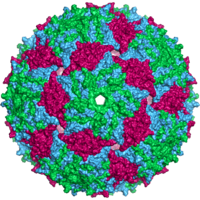MS2 phage
| Bacteriophage MS2 | |
|---|---|
 |
|
| Bacteriophage MS2 capsid | |
| Virus classification | |
| Group: | Group IV ((+)ssRNA) |
| Family: | Leviviridae |
| Genus: | Levivirus |
| Species: | Bacteriophage MS2 |
The bacteriophage MS2 is an icosahedral, positive-sense single-stranded RNA virus that infects the bacterium Escherichia coli and other members of the Enterobacteriaceae. MS2 is a member of a family of closely related bacterial viruses that includes bacteriophage f2, bacteriophage Qβ, R17, and GA.
In 1961, MS2 was isolated by Alvin John Clark and recognized as an RNA-containing phage very similar to bacteriophage f2.
In 1976, the MS2 genome was the first genome to be completely sequenced. This was accomplished by Walter Fiers and his team, building upon their earlier milestone in 1972 of the first gene to be completely sequenced, the MS2 coat protein. These sequences were determined at the RNA level, whereas the next landmark achievement, the sequence of the bacteriophage ΦX174 genome in 1977, was determined using DNA. The first effort at a statistical analysis of the MS2 genome was a search for patterns in the nucleotide sequence. Several non-coding sequences were identified, however at the time of this investigation (1979), the functions of the non-coding patterns were unknown.
The MS2 genome is one of the smallest known, consisting of 3569 nucleotides of single-stranded RNA. It encodes just four proteins: the maturation protein (A-protein), the lysis protein, the coat protein, and the replicase protein. The gene encoding lysis protein (lys) overlaps both the 3'-end of the upstream gene (cp) and the 5'-end of the downstream gene (rep), and was one of the first known examples of overlapping genes. The positive-stranded RNA genome serves as messenger RNA, and is translated upon viral uncoating within the host cell. Although the four proteins are encoded by the same messenger/viral RNA, they are not all expressed at the same levels; expression of these proteins is regulated by a complex interplay between translation and RNA secondary structure.
...
Wikipedia
